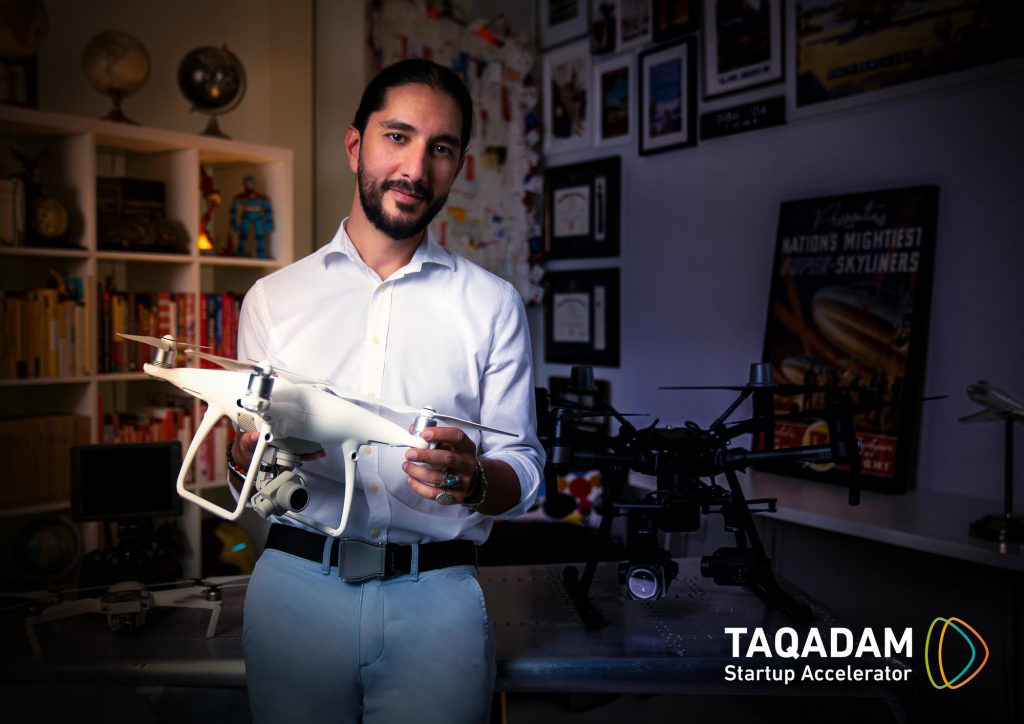TAQADAM Startup Accelerator graduate Firnas Aero is an innovative DaaS startup (drone-as-a-service) designed to spot delay-causing debris on airport runways. Today, they’re a thriving business based out of KAUST’s Research Technology Park — and their innovative use cases and global interest is booming.
Chances are you never think about runway debris — until it delays your flight. On average foreign object debris (FOD) accounts for up to four closures per day, per runway. But inspecting runways in real-time is challenging as typical commercial runways can be up to 4,000 meters in length.
It’s a common challenge Firnas Aero co-founders Tariq Nasraldeen — a former commercial pilot and airport executive — and Sariah Al-jefri sought to overcome. The “drone-as-a-service” (DaaS) startup uses drones to inspect runways as well as industrial complexes, railroads, lamp posts, roads, farms, and more — all spaces difficult to monitor in real time.
“When I worked in Jeddah Airport, I used to see how they closed the runway for a long time to look for debris,” Nasraldeen says. “Instead of manually looking at 5,000 pictures, the software does most of the work and detects where the objects are.” Firnas Aero drones, he explains, fly over runways, take pictures, and alert airport teams to runway debris. “It doesn’t need to rely on the human element.”
Their startup also helps prevent more significant delays, damage, and potentially sky-rocketing debris removal or repair costs.
“If somebody wants to inspect the lamp post on a road or highway, you have to close down that specific area,” Nasraldeen says. “Then you need to get a crane, get people on it, go up to identify the issue, go back down to get the right tools, and then back up to fix it. It takes a very long time just to inspect one part of a runway or a single lamp post.”
Launching Firnas Aero at TAQADAM
In 2018, Nasraldeen and Al-jefri officially launched Firnas Aero. The business, they explain, brought together drones’ unique agility with cutting-edge cameras, sensors, and software for a completely turnkey inspection experience. Later, the team added AI computer vision, which automatically analyzes thousands of images, to better pinpoint the debris’ precise location.
“With the drone, you can fly out and take very high-resolution pictures or thermal images to give a diagnosis of let’s say 50 or 100 lampposts,” Nasraldeen explains. “So you don’t need to check each one in-person,” he continues, “You’ll only go to the ones that have the problem and you’ll already know exactly what the problem is when you go to fix it, so this will save a lot of time.”

Accelerating Their Vision at TAQADAM
In 2019, Nasraldeen and Al-jefri were accepted to the TAQADAM Startup Accelerator. This, the pair note, changed everything for their then-fledgling startup.
“I would highly recommend it for anyone who has an idea because if you think an idea is important to you then you should give it a try and make the effort and see how far it can go,” Nasraldeen says. “The networking, the mentors, and the other entrepreneurs we met during the nine months enabled us to see how different people think. And along the way you adjust your own thinking and idea and it grows and evolves.”
Since graduating from the accelerator — and winning at the TAQADAM Showcase — Firnas Aero has continued its meteoric growth.
“After the TAQADAM Accelerator, I left my full time job so I was able to focus,” Nasraldeen says. “In addition, the amount we got as a grant from winning really helped us move in the right direction.”
The learnings and mindset coming out of TAQADAM also helped the team as they worked through a global pandemic. The COVID-19 outbreak significantly curbed worldwide travel — and, with it, demand from Firnas Aero’s core audience declined. That, though, didn’t stop Nasraldeen and Al-jefri, the founders explored a number of unique use cases and industries to keep them accelerating and evolving.
“We have received requests for drone delivery services, which in the past wasn’t technologically feasible,” Nasraldeen says. “But now with the pandemic and lockdowns, the government and other organizations are very interested in delivering solutions for food and medication.”
Interested in applying to the 2021 startup accelerator cohort — or know someone who should? We’re now officially accepting applications. Apply now through April 10, 2021, for a chance to secure a spot in the next class


